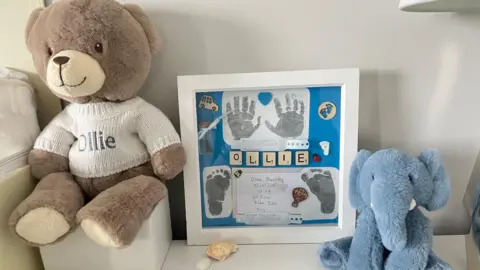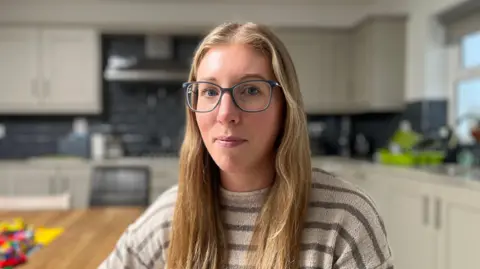A heart-wrenching ordeal unfolded for Victoria and Kyle Buckley after the death of their baby Ollie, who was sent from Northern Ireland to England for a post-mortem examination due to a lack of specialist paediatric pathologists in their home region. Victoria describes the experience as “unnatural” and says it will “haunt” her forever.
Currently, Northern Ireland faces a significant gap in paediatric pathology services, with no local specialists to carry out post-mortem examinations for infants and children. As a result, families like the Buckleys are left with no choice but to send their deceased babies to Alder Hey Children’s Hospital in Liverpool for examination a process that Victoria describes as emotionally devastating.
Since 2019, the Northern Ireland Department of Health has arranged for interim services with Alder Hey Children’s Hospital, which has now been extended until March 2027. In total, over 1,100 children and babies from Northern Ireland have been sent to Liverpool for post-mortem examinations, with each family forced to endure the trauma of separation during a profoundly sensitive time.
Ollie, born at 37 weeks at Antrim Area Hospital in May 2024, was one of those infants sent away for examination. His death, which came as a result of a stillbirth, marked a devastating chapter in the Buckleys’ journey. Victoria shared that Ollie’s death was one of three stillbirths that week in the maternity unit, further exacerbating the situation due to what was described as a “backlog” in the system. The body of their baby was delayed for several days before being transported by undertakers to Alder Hey.
The experience of saying “goodbye” twice to a deceased child is unbearable for any parent. Victoria recalls the gut-wrenching moment when she was asked to place Ollie’s body into a cold metal box for transportation to Liverpool. She expressed how this moment left an indelible scar on her heart.

“Just this innocent little baby lying there. I had put him into a cold metal box to go to Liverpool, and I wasn’t sure when I was going to see him again,” Victoria shared, revealing the anguish of not knowing when or if they would ever hold their child again.
The Belfast Trust, which manages the transportation of bodies for post-mortem examinations on behalf of all health trusts in Northern Ireland, reported that fewer than five families have chosen to travel to Liverpool with their babies. However, the Buckleys, along with many other parents, were not given the option to accompany their deceased child on this harrowing journey.
The Magees, another couple who experienced a stillbirth, shared their devastating story as well. Laura and Andrew Magee discovered during a 20-week scan in August 2020 that their daughter, Poppy, no longer had a heartbeat. What followed was a series of decisions they had to make, including whether they wanted a post-mortem examination, and ultimately agreeing to have their baby sent to Liverpool for the examination.
Laura Magee described this request as cruel and heart-wrenching, further compounding her grief. “It made the grieving process longer and made my recovery longer,” she said, explaining how the burden of this decision weighed heavily on her mental health, leading to anxiety, depression, and nightmares.
Both the Buckleys and the Magees are part of a WhatsApp group called StrongMumsNI, which consists of 67 members who share their experiences of navigating the trauma of infant loss and the challenges of the current healthcare system in Northern Ireland.

The grieving parents are now calling for change, questioning why an all-island service for paediatric post-mortem examinations is not being prioritized. They believe that such a service could prevent families from being forced to send their deceased babies across the Irish Sea and from enduring unnecessary additional trauma.
“Why do we continue to send babies by boat to Liverpool?” said Victoria. “This is a broken system, and we have no faith in it anymore.”
These parents are not only seeking to understand why such arrangements continue but are also pushing for more transparency in the process. They voiced frustration over the lack of regular updates on the whereabouts of their babies and were left in limbo about when, or even if, their children would be returned home.
The Department of Health in Northern Ireland has acknowledged the significant emotional and logistical toll this practice takes on families. Health Minister Mike Nesbitt has expressed that he is committed to finding a better solution to this issue, emphasizing that the requirement to send babies to England for post-mortem examinations exacerbates the trauma by removing critical support networks at a time when families need it most.
While discussions have been ongoing about the possibility of an all-island service, progress remains slow. The Department of Health in the Republic of Ireland has explained that while there are no significant delays in post-mortem examinations in its jurisdiction, the issue remains complicated due to a shortage of staff, particularly paediatric pathologists. The Royal College of Pathologists also highlighted the worldwide shortage of pathologists, including those specializing in paediatrics, which further complicates the situation.
Professor Marta Cohen of the Royal College of Pathologists has stated that even an all-island service might not be a solution due to similar staffing shortages across the Irish border.
“The shortage of paediatric pathologists is a worldwide issue, and even if Ireland tried to help, they would face the same challenges in recruiting and retaining these specialists,” Cohen explained.
Stay Ahead with the Latest News on Global Innovation, Leadership, Entrepreneurship, Business, and Tech
Join us on WhatsApp or Telegram for real-time updates. Have a report or article? Send it to report@theinnovationtimes.com.
Follow us on X (Twitter), Instagram, LinkedIn, Pinterest, and Facebook for more insights and trends.


